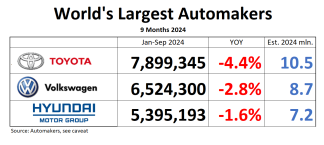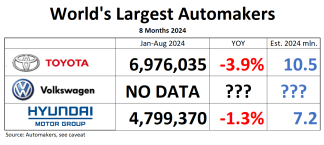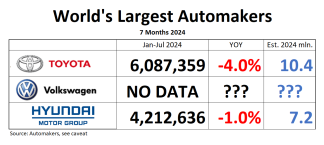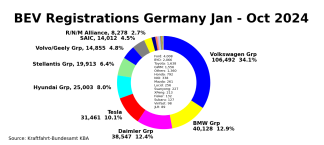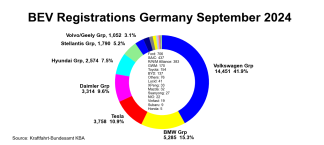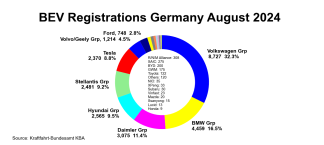In 2009, when Sergio Marchionne’s team presented the first five-year plan for what would become Fiat Chrysler Automobiles (FCA), his VP for Quality Doug Betts told attendees that Chrysler’s quality problems would soon be a thing of the past. Thanks to Fiat’s superior fit-and-finish standards and “World Class Manufacturing” system, Chrysler hoped to match the best mass-market competitors on quality by 2012 according to Betts. Three years after that initial goal had passed unaccomplished, Betts is gone but FCA’s US-market brands are still occupying the bottom tier of Consumer Reports’ most recent automotive quality survey. With quality problems plaguing even its “halo” Hellcat and Ecodiesel engines as recently as last week, it’s clear that Marchionne hasn’t been able to bring the long-term quality backmarker up to pace.
Betts left Chrysler last October, just one day after Consumer Reports’ most recent reliability survey placed its brands among the worst in the US market. Shortly thereafter, CEO Sergio Marchionne made it clear that Betts was held responsible for poor quality, saying
“I am not taking issue with the survey itself, other than it is clear that we have focused on the wrong things in dealings with some parts of the customer base. We need to go back in and fix that perception because I know that from an engagement standpoint the whole house has been driven in a completely different direction that those surveys are indicating. So we have an absolutely mismatch of internal evaluation and commitment… I just think we need to fix the perception and the reality problem and we will do that with the change in leadership…I think that we will fix it and fix it quickly.”
This stands sharply at odds with Marchionne’s earlier rhetoric on the topic, which argued that Fiat’s “World Class Manufacturing” would cleanse Chrysler’s Augean auto assembly plants of waste and defects. More importantly, it stands at odds with the evidence that Chrysler’s quality problems are so deeply entrenched, no single executive change or cribbed-from-Toyota quality system could fully turn it around.
After all, Chrysler’s quality problems seem to be coming from nearly every possible corner. In just a few of the most recent issues to hit the media, FCA has shown it has problems with everything from a lack of development testing (vibration leading to cracks in Ram Ecodiesel exhaust coupling), to assembly problems (Hellcat fuel leaks). Supplier problems have also featured heavily in FCA’s quality snafus, most recently in a recall of Chrysler 200 transmissions due to “inconsistent assembly procedures at a supplier’s plant,” even as Marchionne has targeted supplier profits. But perhaps most troubling is the evidence that FCA simply isn’t able to catch quality problems before cars go out to customers.
A Chrysler insider who posts at the AllPar forums under the name “Mr Source” raised the alarm about FCA’s inability to catch quality defects last year, posting that quality audits for Chrysler 200 had failed to catch “imperfectly aligned body panels.”
after making again another quality audit, we still found doors, hood, and trunks bad aligned, don’t know what’s going on with the quality supervisors and the audits at the plant, but after several weeks of production we still found those kind of problems.
If this is true, FCA’s continued stay at the bottom of the quality rankings is totally unsurprising. Defects happen, and everybody in manufacturing (short of GM’s CEO, apparently] knows that “zero-defect” is a goal that can never be fully attained. But if you catch problems and don’t fix them, as Mr Source says that the company he works for does, there is simply no hope of improving. This is why the “Toyota Way” that Marchionne admits “World Class Manufacturing” cribs from includes Andon, a system that allows workers to stop the production line when a defect is found. If a manufacturing defect is not immediately solved at the source, it becomes infinitely more difficult to find, track and fix later. Thus, without strong auditing functions quality improvement is basically impossible.
Rather than truly understanding and embracing Toyota’s quality system, Marchionne seems to simply use it as a marketing gimmick. In a cheeky ad that was released to Youtube just days before Betts was let go last October, FCA mocked the notion that Japanese automakers have a monopoly on quality. “Reliability,” sneered its tagline, “is now an American thing.” The problem is that quality is still not “a Chrysler thing,” in part because FCA does not appear to embrace the Toyota Way pillars of religiously auditing plant quality and developing mutually-beneficial supplier partnerships. Instead, a fired executive scapegoat and a snarky ad were deemed a solution to a long-term quality problem. Little wonder Chrysler still finds itself at the bottom of Consumer Reports recommendations.

